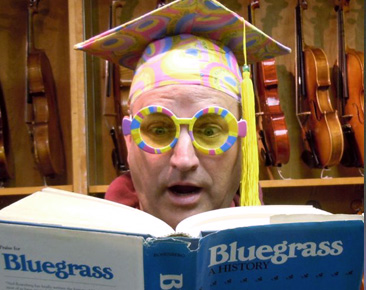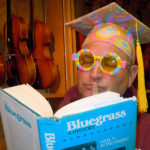
 This week’s guest trivia master is Roland White, born Roland LeBlanc in Madawasca, Maine. The bluegrass Roland is not to be confused with the Roland LeBlanc who was captured at the Battle of Crécy in 1346 and later exchanged for three English knights and an autographed copy of the LP The Crécy Colonels: Live at the Tower.
This week’s guest trivia master is Roland White, born Roland LeBlanc in Madawasca, Maine. The bluegrass Roland is not to be confused with the Roland LeBlanc who was captured at the Battle of Crécy in 1346 and later exchanged for three English knights and an autographed copy of the LP The Crécy Colonels: Live at the Tower.
Roland grew up speaking Canadian French, or possibly French Canadian, at home until the family moved to Southern California in 1954 where he learned to speak Southern Californian. This explains the title of his first album: Dude, I Was Born to Surf.
Roland is best known for his long, illustrious career playing mandolin or guitar for the Country Boys, the Kentucky Colonels, Bill Monroe, Lester Flatt & the Nashville Grass, Country Gazette, The Roland White Band, and the Nashville Bluegrass Band, though many in California still remember him for his washboard antics with the fabled SoCal Sassy Sultans of String.
Roland played with two first generation artists: guitar with Bill Monroe and mandolin with Lester Flatt. If he can get a gig with Ralph Stanley, he’ll have completed a first-generation hat trick, which comes with a $500 cash prize and a bus trip home.
He is also immortalized in the bluegrass standard, Roland in My Sweet Baby’s Arms.
Contest & Prize
Here are a few questions gleaned from the master himself. The winner of this week’s contest will win a signed CD from either Roland LeBlanc or Roland White:
1) Who played guitar on the Monroe recording of Walls of Time that has that cool guitar run? This is not a trick question. Really. Rhymes with “Golan Height.”
2) The mandolin that Roland played with the Kentucky Colonels from 1963 to 1966 was the first F-5 model that he owned. Who did Roland buy this mandolin from in 1963?
3) When Roland went to work for Lester Flatt in 1969, he bought a mandolin from Jesse McReynolds that was made by what famous luthier? What number was it?
You Can’t Make This Stuff Up
Question of the Day (Difficulty 7.8):
This one comes from Neil Rosenberg and Charles K. Wolfe’s magnum opus The Music of Bill Monroe, published by the University of Illinois Press and essential reading. (Smarty Pants Alert: Neil Rosenberg will be the next guest trivia master here.)
• Who sang the duo with Bill Monroe on the original recording of Walls of Time and when was it released?
See answer below.
You Can Make This Stuff Up
Mr. BGSP accepts questions of a farcical nature as well as questions relating to advice on the bluegrass lifestyle. Your gigs may vary.
Dear Mr. Blue Grass Smarty Pants,
With Halloween coming up, what will be the cool bluegrass costumes to wear this year?
—Dexter in DeKalb
Dear Dexter in DeKalb,
While last year saw a lot of Del McCoury Hair and Unknown Bass Players, this year sees a return to traditional bluegrass horror with Little Willie being the trendsetter. While most people will be going as Little Willie from the song Little Willie, you can make a fashion statement by going as either Little Willie from Banks of the Ohio, or for the truly hip, the bloodier Little Willie from Willow Garden. (He’s not named in the song, but, come on, who else could it be?)
—Mr. Blue Grass Smarty Pants
Dear Mr. Blue Grass Smarty Pants,
I just heard that Chris Thile won a MacArthur Foundation Genius Award. Are there other geniuses in bluegrass and how can you tell?
—Eugene in Eugene
Dear Eugene in Eugene,
While there are many smarty pants in blue grass, geniuses are as rare as in any other segment of society. There are a few, though. Ira Gitlin appeared on Are You Smarter Than a Banjo Player? and Ron Thomason speaks all 42 dialects of southwestern Kentucky. Tex Logan invented reverb and wrote Christmas Time’s A Comin’ on the same day while looking after a cranky four-year-old.
The great fiddle player Albert Einstein once told me over smoothies, “The difference between stupidity and genius is that genius has its limits.” I’m honored that he went on to say that he felt my career was unlimited.
—Mr. Blue Grass Smarty Pants
Answer to Question of the Day: Roland White sang the lead on the 1967 version of Walls of Time, but that version was not released until 1994! See Rosenberg and Wolfe’s The Music of Bill Monroe, p. 159.




